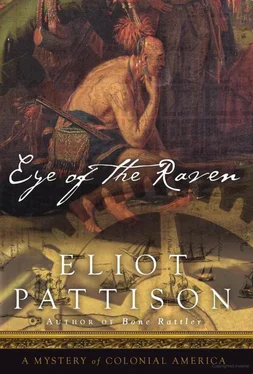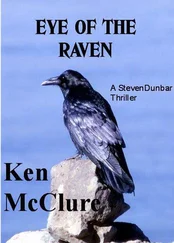Eliot Pattison - Eye of the Raven
Здесь есть возможность читать онлайн «Eliot Pattison - Eye of the Raven» весь текст электронной книги совершенно бесплатно (целиком полную версию без сокращений). В некоторых случаях можно слушать аудио, скачать через торрент в формате fb2 и присутствует краткое содержание. Год выпуска: 2010, ISBN: 2010, Издательство: Counterpoint Press, Жанр: Исторический детектив, на английском языке. Описание произведения, (предисловие) а так же отзывы посетителей доступны на портале библиотеки ЛибКат.
- Название:Eye of the Raven
- Автор:
- Издательство:Counterpoint Press
- Жанр:
- Год:2010
- ISBN:9781582437019
- Рейтинг книги:5 / 5. Голосов: 1
-
Избранное:Добавить в избранное
- Отзывы:
-
Ваша оценка:
- 100
- 1
- 2
- 3
- 4
- 5
Eye of the Raven: краткое содержание, описание и аннотация
Предлагаем к чтению аннотацию, описание, краткое содержание или предисловие (зависит от того, что написал сам автор книги «Eye of the Raven»). Если вы не нашли необходимую информацию о книге — напишите в комментариях, мы постараемся отыскать её.
Eye of the Raven — читать онлайн бесплатно полную книгу (весь текст) целиком
Ниже представлен текст книги, разбитый по страницам. Система сохранения места последней прочитанной страницы, позволяет с удобством читать онлайн бесплатно книгу «Eye of the Raven», без необходимости каждый раз заново искать на чём Вы остановились. Поставьте закладку, и сможете в любой момент перейти на страницу, на которой закончили чтение.
Интервал:
Закладка:
"Did he? Ambush them?"
"It was damned curious. When they appeared, he quieted and just gestured them along to the street before starting his dance again. By the time the fire company arrived there wasn't much to do but water down the house next door. All the while that heathen stayed, speaking in his devilish tongue."
"They arrested him?"
"Most wanted to lynch him on the spot. But that is not the way of the Quakers who run this town. Words have to be spoken first to make things right. They trussed him up like a wild bull and held a proper trial the next week. He never resisted, never argued."
"And?"
"We hanged him, of course. Most of the town turned out. He was one of those whose neck didn't snap. He just hung there and twisted, slowly strangling."
Conawago buried his head in his hands. Duncan stared into his cup. "Did he speak in the end?"
"Nary a word. Except when he climbed the scaffold he called out, not in protest, just shouted toward the sky. One of the farmers who spoke a little heathen said he was calling his name to the spirits, to let them know he was on his way."
Duncan and Conawago exchanged a tormented glance. They needed no further explanation. It was clear that Skanawati's brother had not understood what Townsend had drawn on his map. That a white man would capture a sacred place on paper would have been unimaginable. Yet it had happened, and to prevent Skanawati from taking suicidal action he had taken his own, donning his war paint and correcting his unforgivable mistake, burning down the house to be sure the map was destroyed.
"What happened to this Townsend afterward?" Conawago ventured.
"Like I said, a restless soul. A week after the fire he came in and declared he had a new commission as a surveyor. There was new coin in his pocket. He said he would be soon gone and wanted to pay advance board for his sister to sup here twice a week, for three months, though that ran out months ago. Never saw him again. Dead in the wilderness, people say. Without his support, his sister's had to take up household service."
"Surely becoming a surveyor requires an apprenticeship," Duncan observed.
"This colony suffers from land fever. Private companies being formed every day to acquire land, usually in competition with each other. All the trained surveyors have their hands full with the local conveyancing. The companies, what they need is gross work, one might say. More like rough mapmaking, and most of that in secret. The more definite a claim the more likely it is for the courts to uphold it. Hell, at this point I think anyone who can read and write and has the spine to face the Indians can find a commission."
"Where does one go to hire such a surveyor?" Duncan asked. "Do they have a hall?"
"Lord boy, this is America. We have no guild halls." He grinned as he rose from his seat. "But we have taverns. Down near the river, below Walnut Street, that's where they go. The Broken Jug, mostly, after the supper hour."
Duncan pulled out one of the clock gears from his pouch and spun it between his fingers. "Meanwhile we seek a clockmaker."
"Which one? This be Philadelphia. Most American clocks are made here. You could spend a day and not visit all their shops."
"The nearest then," Duncan pressed.
A quarter hour later they stood by the worktable of a middleaged bespectacled man leaning over a small vise, assisted by a candle mounted with a lens that collected the light onto the gear he worked on. He had assessed them with a quick glance when they stepped into his shop, apparently concluding they were not potential customers, so he kept them waiting as he worked with a tiny file.
Finally he looked up with a barely tolerant expression that softened only when Duncan produced one of the gears and spun it like a top on his bench.
The man wiped his hand on his leather apron, snatched up the gear, and studied it a moment before passing it back. "Your complaint is not with me," he declared.
"I beg your pardon?" Conawago asked. His refined tone caused the clockmaker to hesitate.
The man frowned. "When someone appears with a piece taken from a gear works, it is to complain. They think because they have dropped the clock or suffered it to travel over rutted roads that it is the maker's fault when it fails to respond."
"How can you be so certain it is not your work?" Duncan wanted to know. He extended one of the other gears, a pinion, and displayed it on his palm.
"I import most of my gears from England. Yours is meant for a farmer's clock, a crude but cheap machine. Although that one never saw the inside of a case."
"How can you know that?"
The craftsman sighed, extended his palm for the gear, then lifted an instrument like a tiny awl to point to an imperfection in the gear teeth, a place where whoever filed it had slipped, causing an irregular spacing. "An incompetent apprentice," the clockmaker groused.
"And how many incompetent apprentices are there in Philadelphia?" Duncan asked.
The clockmaker snorted. "In those workrooms making mantel instruments for the low trade? Probably one in every shop."
"Why mantel clocks?"
"The pendulum meant for this gear is nine inches long." The man saw the confusion on Duncan's face and gestured for Duncan to hand over the second gear in his palm. He held up the small one. "The pinion that fits into the wheel has six teeth-" here he set the larger gear against the pinion, meshing the teeth. "The large wheel has seventy-two teeth. That is a combination for the short, fast pendulum of a mantel clock." The man gazed at his candle a moment. "Which gives you perhaps three or four likely candidates, all in the cheaper shops along the waterfront, below Walnut."
"Near the Broken Jug?" Duncan ventured.
"All within a short walk of the old jug," the clockmaker confirmed, then cocked his head in confusion at Conawago. As they stepped out onto the cobbled street the man was still staring at the miniature cairn of gears Conawago had made on his table, topped with a yellow feather.
They had eliminated one of the likely clock shops and were approaching another when an urchin ran past, calling out details of a new hanging as he hawked a broadside. Shuddering, Duncan saw his friend staring at a large nondescript brick building on the river side of the street. It appeared to have been built as a ship chandler's storehouse, though there were no ships' masters conducting business, no sailors milling about, no heavy wagons, only a single stylish carriage parked near its door.
Without a word Conawago swiftly crossed the street and tried the front door, then began pounding on it when he found it locked. Duncan glanced at the passersby, already casting suspicious glances, then tried to pull his friend away. Instead Conawago set his face against a window and peered inside.
"You forget there are constables!" Duncan warned. They had noted a half dozen of the large men with staffs since leaving the first clockmaker. "If they see you looking into a building they will surely question you!"
Conawago paused, then let Duncan pull him away, across the street in the direction of the next clock shop. But he would not proceed without first stopping to study the two-story building as if interested in its construction. Duncan tried in vain to make sense of his strange actions. Surveying the structure himself, he noticed the strange metal spikes mounted along the roof, the cradles on the sidewalls once used for holding heavy rope, the winch under the eaves for loading cargo through an upper hatch. Conawago touched his arm and pointed to the main entrance of the building.
The frame of the main entrance had been decorated with ornate, abstract patterns of brick after the Dutch fashion, but the pattern on the lintel over the frame suddenly congealed. With purple and white paint someone had carefully depicted figures from a wampum belt, the stick figures of straight Indians and triangular Europeans holding hands in friendship. A peace belt.
Читать дальшеИнтервал:
Закладка:
Похожие книги на «Eye of the Raven»
Представляем Вашему вниманию похожие книги на «Eye of the Raven» списком для выбора. Мы отобрали схожую по названию и смыслу литературу в надежде предоставить читателям больше вариантов отыскать новые, интересные, ещё непрочитанные произведения.
Обсуждение, отзывы о книге «Eye of the Raven» и просто собственные мнения читателей. Оставьте ваши комментарии, напишите, что Вы думаете о произведении, его смысле или главных героях. Укажите что конкретно понравилось, а что нет, и почему Вы так считаете.












